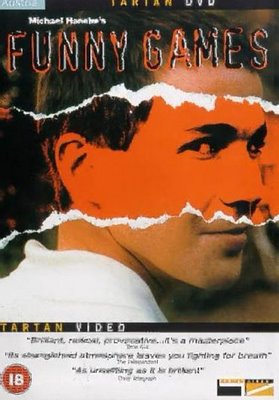Michael Haneke's Funny Games

Michael Haneke's Funny Games is less of a horror-thriller than a meta-cinematic, post-modern distillation of the cliches and the conventions of the genre. It is more like a theoretical, critical essay on representation of violence in cinema. Sounds dull and dour? Well, it is not. It is also a brilliantly executed thriller in itself, expertly staged and handsomely acted, with a taut narrative and sharp dialogues, which keeps you on the edge for the entire length of the film, while at the same time consciously denying all the pleasures or thrills that are generally expected from a horror-thriller at every step of the way.
The plot is deceptively simple. A pair of smooth talking, young twenty-somethings break into a house of a bourgeois couple who are vacationing in their lakeside countryhouse and systematically start to torture them physically and emotionally. But as they say, the devil is in the details. When the husband asks the killers why they are doing this, one of them starts telling the story about how the other had a terrible childhood, committed incest and and became a queer and a psychopath and the other starts crying only to break into a laughter after the story ends. Thus mocking theirs and ours need for pyschological explanations that we expect from a thriller. Not that pyschological explanations for violent behavior don't exist but rather it enables the viewer to turn into a voyeur by making it easy for him to distance himself from the perpretator of the violence. I also thought the incest angle was perhaps a sly reference to Hitchcock's Psycho. The torturer also offers some other "explanations" and offers the couple and the viewers to choose one, best of which was "ennui, world-weariness and the terrible void of existence"! Somewhere else, Haneke shows a close-up of a knife thus adding a sense of foreboding in the audience that the knife will play a crucial role in the narrative but when it comes to that, it is completely offscreen. Also notable is the fact that although the film is infamous for being extremely violent, none of the violence occurs onscreen. We are even spared the close-ups. There is also a remarkable scene [SPOILER] in which the wife gets a chance to pick up a gun and shoots one of the guys. But then the other one takes a remote and "rewinds" to the scene and then takes the film to a different, more brutal ending. This is the most cruel mockery of our need for those thriller type "wow-moments" in a film that I have ever seen. I am sure after watching this scene your whole experience of watching a thriller would change forever.
In short, although definitely very heavy going and strictly for adult and mature sensibilities (the whole thing is a profoundly disturbing affair), this is a remarkable and rewarding viewing experience. Some reviews and links: Jim Hoberman in Village Voice calls Cronenberg's A History of Violence, "a successful version of Michael Haneke's audience-bashing Funny Games", with which I couldn't disagree more. If there was a element of self-critique and self-reflexivity in Violence I completely missed it. To me it was exactly the kind of violent film that it is supposed to deplore. The pleasures of the film are strictly conventional -- "good guys shoot bad guys in style after they are cornered and the audience claps". Other critics accuse Haneke of being self-righteous, preachy and manipulative but I think in doing so they forget that the film is not a realistic representational movie but more of an abstract, theoretical essay. The characters are types and tropes used by the filmmaker to drive home a point, something that any writer of a rhetorical essay does. Also there are other critics who say that Haneke, in his critique of conventional horror-thriller movies, is underestimating the audience's capabilities of differentiating between fiction and reality, which I think is a more complex question. Does fictional depiction of suffering make us more sympathetic (as Picasso claimed while justifying his painting of Guernica) or does it desensitise and makes us indifferent of the real pain and suffering? To which the answer definitely is: it depends. Depends on the motive of the artist and the audience. Surely the senseless consumption of empty thrills and chills that are the staple of hollywood have the potential to turn us into emotional zombies. And to which films like Funny Games are supposed to act as a corrective. Some critical and laudatory articles on the film are here, here and here.
Previous posts on The Seventh Continent and Cache.
No comments:
Post a Comment